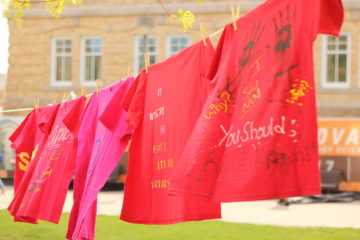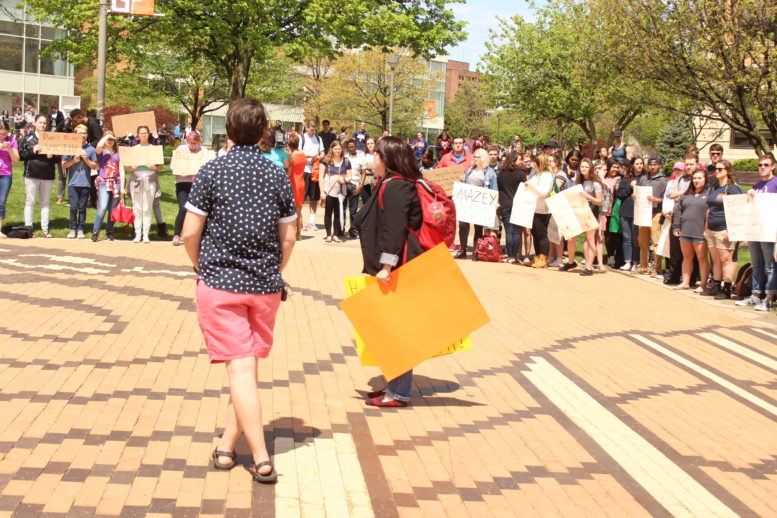By DAVID DUPONT
BG Independent News
Sandra Faulkner wants Bowling Green State University to be the leader in combating sexual assault on campus.
The director of Women’s, Gender, and Sexuality Studies hopes that the recent protests over the way BGSU handles sexual assault will lead to innovation, not duplication of other universities’ “best practices.”
“No institution in higher education handles sexual violence well,” she said.
Faulkner and her colleague Sarah Rainey, an associate professor in the School of Cultural and Critical Studies, met with Dean of Students Jodi Webb Friday in the wake of a protest that drew about 200 students.
In their meeting with Webb, Faulkner and Rainey brought with them a list of actions, drafted by members of the Women’s, Gender and Sexuality Studies faculty, that BGSU could take immediately to start addressing the problem.
On Monday President Mary Ellen Mazey announced the formation of Task Force on Sexual Assault. Rainey is one of 17 members appointed to the task force. The task force includes faculty, staff, students, the student member of the Board of Trustees, and a representative from The Cocoon. (http://bgindependentmedia.org/mazey-to-launch-task-force-on-sexual-assault/)
According to President Mary Ellen Mazey’s letter announcing its creation, the task force’s charge is: “to review our policies and procedures for Title IX and sexual assault, benchmark our efforts against best practices across the country, and provide recommendations to improve the campus culture and our policies. In addition, the task force will examine our services for supporting sexual assault victims and evaluate our awareness and prevention efforts.”
Both Faulkner and Rainey were encouraged by the composition of the task force.
Faulkner is concerned about the word “benchmark.”
“We shouldn’t be benchmarking with anyone,” she said. “We should innovate. We should do more.”
Other institutions should be looking to BGSU as the model.
While the Task Force is expected to gather before summer, Rainey said she expects the work to start in earnest in August when the fall semester begins. It would be hard to meet throughout the summer given faculty and students are not always on campus.
They indicated a report would be made by the end of the year.
Before then they and their colleagues and students would like certain steps to be taken.
The university must do a better job of educating students about the issue. That would include information about prevention as well as what options are available to victims.

The Clothesline Project, sponsored by The Cocoon, on display in April at BGSU. The shirts each represent a victim of sexual violence.
All student victims have the right to have a victim’s advocate. That service is through The Cocoon, and is paid for by the Cocoon through a grant.
Faulkner and Rainey propose the university fund the position because grant funding is by its nature uncertain. “We should do more to help promote and support that position,” Rainey said. “That role is incredibly important. They are going to make sure that the victim knows all her options.”
“The system can be overwhelming for a student to navigate,” Faulkner said. That’s why having a neutral party is important.
The position, however, should remain at the Cocoon to avoid the perception that university employees are looking out more for the institution’s interests than those of the victim.
In an interview Friday, three university officials involved in investigating sexual assault discussed the university’s handling of such cases.
They said they could not comment on specific issues raised by the protest the day before, but only explain how the system for handling those complaints.
Faith DeNardo, the interim Title IX coordinator said it was important for students to know they have options and support, through the process and afterward.
They can report an incident to the police, through the Dean of Students Office, or to the Title IX office.
From there a process begins.
If the victim wishes to pursue criminal charges then campus police get involved. The police, Interim Chief Mike Campbell said, have to determine jurisdiction. If it happened on campus the BGSU department will investigate. If it happened off campus the case is turned over to the city police. Even if the case is turned over, Campell said, his officers will assist the victim in any way they are able.
Regardless of how the police case is determined, it must be reported to the Title IX office.
That office then conducts its own investigation. An initial interview is conducted to determine the claim and make sure the student is informed of the variety of options. Initial actions such as a no-contact order can be imposed. Jeremy Zilmer, assistant dean of students, will get the case.
“I investigate all Title IX cases involving student,. He said. “Seldom will I meet alone with a student.” Usually they are accompanied by a victim’s advocate, parent or a lawyer.
Those interviews can be fraught with emotional landmines.
Campbell said his officers know through their training in “trauma-informed” investigations that some questions they need to ask can be perceived as intrusive and re-traumatizing.”
Campbell said from law enforcement’s perspective getting these details is important if the police are going “to hold someone accountable for their actions.”
At last week’s protest, students criticized questions about what the victim was wearing and how much she had to drink, saying they were a way of putting the onus for the assault on the victim.
Zilmer said sometimes such questions that many view as blaming the victim need to be asked.
Questions about alcohol consumption relate to consent. Someone who is “significantly impaired” cannot consent to sex, he said.
That point was also made by Rainey, though she was doubtful about other lines of questioning..
Questions on what the victim was wearing may relate to determining the amount of force that was used.
Zilmer said he may even have to ask about previous sexual activity if the parties had sex before. What consent looked like in the relationship would be an important determination.
Zilmer then needs to interview the other party accused in the case. The Title IX process needs to be transparent and even handed. All sides need to know all the information uncovered in the case.
The results of Zilmer’s investigation are then turned over to the Title IX board. First the three-member board must decide if there’s enough evidence to warrant going forward with the case. The board operates on a preponderance-of-evidence standard for determining responsibility, not beyond a reasonable doubt as in criminal proceedings.
The student accused can accept responsibility. Then a hearing to determine sanctions, which can range up to expulsion from the university, will be held. Or the student can contest the case at the formal hearing.
Either party can appeal the outcome of the decision whether it’s a finding of responsibility of the severity of the sanctions.
Yet, for Chelsea Halm, the student whose Facebook post sparked the recent protest, this didn’t work. She said in an interview last week that she accepted that there was not enough to pursue a case against her attacker, but then the university failed to keep him and his friends from further harassing her.
She said she was considering further action against BGSU, but could not discuss it further.
Rainey praised Halm for “being brave enough to speak out.”
“There are others who have not,” said Faulkner. “They’re afraid. It’s not an isolated incident.”
Rainey and Faulkner said their meeting with Webb was productive. There is agreement that the climate on campus and the process need to be improved.
Making training more intensive is something, Faulkner said, is something that can happen immediately.
Rainey and Faulkner also want the university to work with the Wood County Hospital to make sure there is a Sexual Assault Nurse Examiner on staff at the Falcon Health Center.
They are also concerned with the future of the Women’s Center. The center has been a key component in keeping the fight against sexual assault in the forefront, and now its future seems vulnerable.
The center is being buffeted with changes. The director Mary Krueger is retiring; the center is moving from Hanna Hall into the first floor of Hayes Hall; and it is being moved from academic affairs to student affairs.
Rainey and Faulkner want the university to commit to replacing Krueger with a full-time director with a PhD and expertise in sexual assault.
There is a perception, they said, that the university’s handling of these cases has regressed in the past couple years. Now it has been pushed to the front burner
“I have confidence the university can do better,” Rainey said. “I don’t think sexual assault will ever go away, but I think we can make a huge impact.”
Faulkner added: “We can be leaders.”





